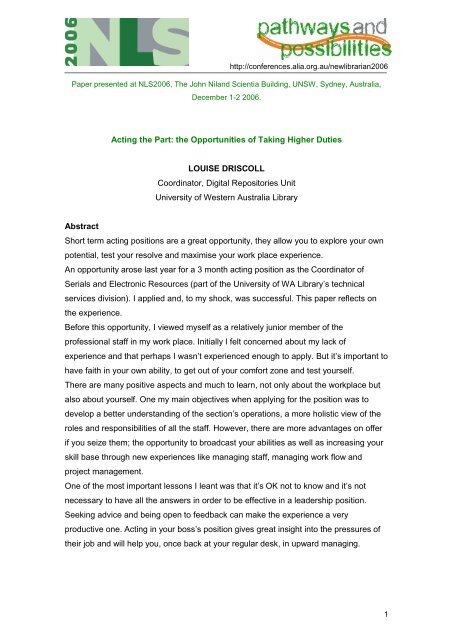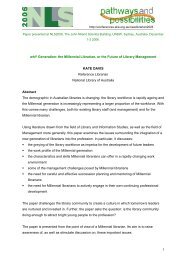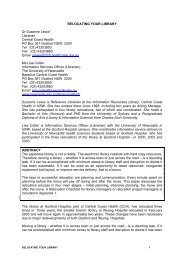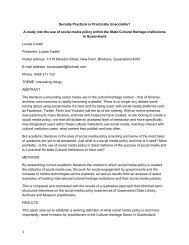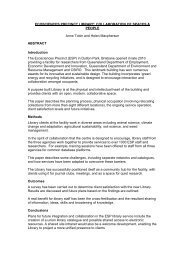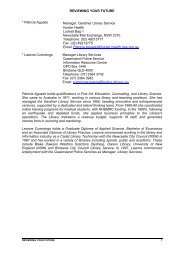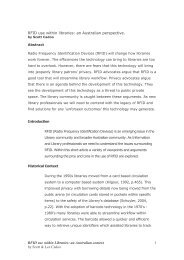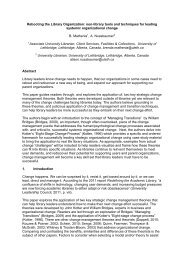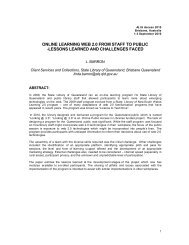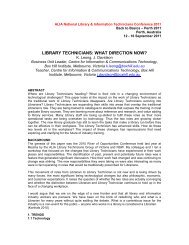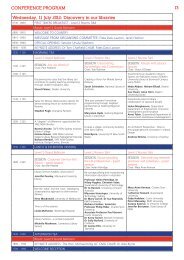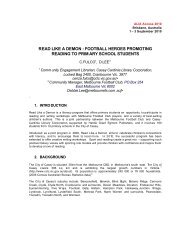Paper - ALIA conferences
Paper - ALIA conferences
Paper - ALIA conferences
You also want an ePaper? Increase the reach of your titles
YUMPU automatically turns print PDFs into web optimized ePapers that Google loves.
http://<strong>conferences</strong>.alia.org.au/newlibrarian2006<br />
<strong>Paper</strong> presented at NLS2006, The John Niland Scientia Building, UNSW, Sydney, Australia,<br />
Abstract<br />
December 1-2 2006.<br />
Acting the Part: the Opportunities of Taking Higher Duties<br />
LOUISE DRISCOLL<br />
Coordinator, Digital Repositories Unit<br />
University of Western Australia Library<br />
Short term acting positions are a great opportunity, they allow you to explore your own<br />
potential, test your resolve and maximise your work place experience.<br />
An opportunity arose last year for a 3 month acting position as the Coordinator of<br />
Serials and Electronic Resources (part of the University of WA Library’s technical<br />
services division). I applied and, to my shock, was successful. This paper reflects on<br />
the experience.<br />
Before this opportunity, I viewed myself as a relatively junior member of the<br />
professional staff in my work place. Initially I felt concerned about my lack of<br />
experience and that perhaps I wasn’t experienced enough to apply. But it’s important to<br />
have faith in your own ability, to get out of your comfort zone and test yourself.<br />
There are many positive aspects and much to learn, not only about the workplace but<br />
also about yourself. One my main objectives when applying for the position was to<br />
develop a better understanding of the section’s operations, a more holistic view of the<br />
roles and responsibilities of all the staff. However, there are more advantages on offer<br />
if you seize them; the opportunity to broadcast your abilities as well as increasing your<br />
skill base through new experiences like managing staff, managing work flow and<br />
project management.<br />
One of the most important lessons I leant was that it’s OK not to know and it’s not<br />
necessary to have all the answers in order to be effective in a leadership position.<br />
Seeking advice and being open to feedback can make the experience a very<br />
productive one. Acting in your boss’s position gives great insight into the pressures of<br />
their job and will help you, once back at your regular desk, in upward managing.<br />
1
Introduction<br />
Acting the Part<br />
Short term acting positions are a great opportunity, they allow you to explore your own<br />
potential, test your resolve and maximise your work place experience.<br />
An opportunity arose last year for a 3 month acting position as the Coordinator of<br />
Serials and Electronic Resources (part of the Library’s technical services division). I<br />
applied and, to my shock, was successful. This paper reflects on the experience. I’ll be<br />
revealing the lessons that I learnt as well as some tips that may help you not only act<br />
the part but win the role.<br />
Fears to allay<br />
I viewed myself as a relatively junior member of the professional staff in my work place.<br />
I was a recent graduate, having begun work as a librarian in early 2003. I had a little<br />
over 2 years in the job, whereas my colleagues’ years of professional experience<br />
totalled more than my age (and then some). In all, this made me feel just a little<br />
intimidated. I felt concerned about my lack of experience, that perhaps I wasn’t<br />
knowledgeable enough to apply. But I threw caution to the wind. I had nothing to lose<br />
by showing that I was interested in taking on a leadership role. It was only an<br />
expression of interest that was being sought after all. It wouldn’t hurt just to hand<br />
something in. Anyway, it wasn’t like I’d get it, right?<br />
Wrong.<br />
The strange thing about this I wasn’t quite sure I could do the job until I was offered the<br />
position. But seeing that I had been handed this opportunity I just had to take it. Don’t<br />
get me wrong, I was still nervous, but if my superiors had faith that I could do it, I<br />
should too. So from starting from a pretty shaking position I’d come around to feeling<br />
that I was capable, and that my limited experience wasn’t seen as a detriment to my<br />
abilities.<br />
So that was my first lesson: It’s important to have faith in your own ability, to get out of<br />
your comfort zone and test yourself.<br />
Louise Driscoll, University of Western Australia Library 2
Giving it a go – what can you gain?<br />
Acting the Part<br />
I won’t bore you with the intimate details of how I spent my time during this period. I<br />
don’t think it really matters about the minutia. It’s more important to look at the larger<br />
picture and draw out the main themes from this experience.<br />
One of my main objectives when applying for the position was to develop a better<br />
understanding of the section’s operations. However, there are more advantages on<br />
offer if you seize them. There’s much to learn, not only about the workplace but also<br />
about your self.<br />
How the other half works<br />
Sitting in someone else’s seat will give you a definite idea of what it is they do all day.<br />
Sitting in my boss’s seat, gave me a definite idea of what he does all day. He’s one<br />
busy guy! Being responsible for a myriad of operational tasks, and staff, and projects<br />
means that time is at a premium. I’m pretty sure my library runs on the maxim - Give<br />
work to a busy person and they’re more likely to get it finished. Knowing this, it’s critical<br />
to manage your time effectively. This sets the scene for the next lesson - upward<br />
managing.<br />
Lesson number two is built on this experience of the hectic schedule that line<br />
managers suffer from. Experiencing life in your boss’ shoes gives great insight into the<br />
pressures of their job. If you need an answer, want to give an opinion, whatever it may<br />
be, it’s really important to be ‘heard’ above all the other ‘stuff’. So, I learnt that I had to<br />
cut through all this. If I wanted to be effective in my job (whether that was my regular<br />
job or the acting one), I had to be as time efficient as possible when delivery<br />
information to my boss. There are three simple steps that I’ve adopted to expedite<br />
good communication:<br />
1. Book in to see them - set up an appointment or schedule some time<br />
2. Be prepared – know what it is that you’re talking about<br />
3. Give them an idea of what it’s about, some warning or background information.<br />
There is NOTHING worse than a surprise! Also let them know what you expect from<br />
them. For example, do you want them agree to a recommendation, or make a decision,<br />
or just hear you out. This allows for them to be prepared too.<br />
Louise Driscoll, University of Western Australia Library 3
Acting the Part<br />
Effective upward managing works both ways. Being regularly briefed is a really great<br />
way to keep in touch with your staff. Seeking their advice and being open to feedback<br />
can make the Higher Duties (HD) experience a very productive one.<br />
Increase your skill base<br />
There were a couple of big holes in my CV that needing plugging. One of these was<br />
supervising staff and the other was project management. There’s no better way to learn<br />
than by doing, and there is no better teacher than experience.<br />
My workplace is quite hierarchical. Although I was a professional staff member with<br />
many professional duties, this didn’t entitle me to boss people about. (You have to wait<br />
until you reach management level to do that.) What this meant was while there was a<br />
lot of opportunity for team work, there wasn’t much for line management. So staff<br />
management was an area that I really wanted to develop. This is where the acting<br />
position came in. Over the 12 weeks, I was responsible for a team of 9 staff members,<br />
made up of a mix of professional (2 librarians), paraprofessional (3 technicians) and<br />
clerical positions (4 library officers). What I discovered was that managing staff is more<br />
than one skill – it’s takes a whole range of skills; communication, delegation, monitoring<br />
tasks and workloads, team building, and conflict resolution just to name a few. One<br />
significant point I learnt was that clear communication with your staff is vital, and a big<br />
factor in establishing good working relationships. This involves developing your abilities<br />
to actively listen, negotiate, and maintain your sense of humour. I got to fill that hole in<br />
my CV with real and relevant examples of staff management.<br />
Project management is another area where it’s really important to get some<br />
experience.<br />
Like most academic libraries, UWA is undergoing rapid change through the introduction<br />
of innovative technologies. This means that there are a variety of projects going on all<br />
the time. During my acting period, I became the project manager for the<br />
implementation of our Electronic Resource Management system. Let me say this<br />
straight off – projects are hard work! This particular project was a mix of software<br />
installation and testing, creating data standards, devising workflows and determining<br />
resourcing. Projects are time and energy vortexes and will take up all your time if you<br />
aren’t careful. One of the greatest challenges I faced was balancing project work with<br />
operational tasks. Time management is one skill that I managed to become quite<br />
proficient at applying. Organising yourself (and others), planning and sticking to a<br />
Louise Driscoll, University of Western Australia Library 4
Acting the Part<br />
schedule, documenting, recording and managing your paperwork are all things that<br />
come to the fore when dealing with projects.<br />
Through new experiences like managing staff, coordinating work flow and project<br />
management you can build your skills base.<br />
Network: Create connections with people<br />
I utilised this opportunity to connect with people outside the unit. The Library where I<br />
work is split into two divisions – Information systems and Client services. Although<br />
there is some crossover, it’s not an everyday occurrence in my regular position. So I<br />
thought it was really important to make each and every interaction with Client services<br />
as positive and personable as possible. This was as low key as being friendly on the<br />
phone, to going out of my way to be proactive on an issue that was important to one of<br />
the subject librarians. It may sound a little redundant but establishing good working<br />
relationships with colleagues is really beneficial for you. Through these types of<br />
interactions I was able to connect with people; and in turn to form my own network of<br />
colleagues that I could call on for their assistance, expertise, advice or opinion. This<br />
was really helpful to me.<br />
One important note: be sure to keep these relationships going. Don’t let them end with<br />
the HD.<br />
Another advantage of making all these connections with people is that you can<br />
showcase your skills to a broader audience. The lesson on this one is to get your face<br />
about. Take every opportunity to broadcast your abilities. Acting gives you a rare<br />
opportunity to widen your profile. Having a positive reputation is one way to make a<br />
lasting impact and a great way to get your foot in the door. You never know who’ll be<br />
on your next interview panel.<br />
Learn about operational areas<br />
There was plenty of stuff going on that I wasn’t previously aware of in my section. A<br />
whole tribe of staff where mysteriously going about their business and I had no real<br />
clue what it was they did all day. Work flows in any workplace can be fragmented and<br />
disjointed, and this is certainly the case in mine. Initially, I was really concerned that I<br />
was responsible for staff and had no idea what their jobs were. I thought I had to<br />
Louise Driscoll, University of Western Australia Library 5
Acting the Part<br />
master all the tasks they carried out so I could lead them. But this isn’t the case. This<br />
was one of my more profound ‘eureka’ moments. I didn’t have to do their job, I had to<br />
do mine. This sounds so obvious now, but this was one of the things that made me so<br />
nervous at the start. It’s not necessary to have all the answers in order to be effective in<br />
a leadership position. My staff had the experience and the know-how. They are the<br />
experts. I had to assist them to do their jobs the best way they could. The most<br />
important aspect is to facilitate, empower and assist others. That was my role.<br />
Quite naturally as my HD progressed I gained a much greater understanding of the<br />
operational tasks carried out by the section. This in turn gave me a more holistic view<br />
of the roles and responsibilities of the staff. The lasting result from this is now I know<br />
who to go to with certain queries or issues. I think it has also improved my sense of<br />
camaraderie, as I got an insight into not only what they were doing and their expertise<br />
but could appreciate the work pressures they are under.<br />
Keep a logbook, or activity diary<br />
Seeing that I was picking up these new skills and proficiencies I started noting them<br />
down, which in the end turned out to be a kind of logbook of my experiences. There are<br />
lots of new and different things that I did, and I thought it important to have a record of<br />
them. (Words of advice here: Do it as you go, you’ll never be able remember them after<br />
the fact.)<br />
One important tip is not to edit your self. Write it all down, even if you think it’s really<br />
basic or menial at the time, include it all. Also include the circumstances or context.<br />
Recording “chaired a meeting” doesn’t really convey what it is that you did. Instead add<br />
in details:<br />
“Scheduled meeting using Outlook, booked meeting room, booked laptop and<br />
organised for IT to set up the room. Finalised agenda and distributed. Coordinated<br />
distribution of project documents to team. Chaired meeting of project team, including<br />
setting up meeting schedule. Meeting ran overtime. Need to work on directing<br />
participants to stay on topic and stick to agenda items.”<br />
There are two really good reasons to keep a diary. Firstly you can use it as a reflection<br />
tool. Analysing the experience forms a vital part of your review process. I’ll follow up on<br />
this point in more detail later. Secondly it allows you to keep examples for use in filling<br />
in selection criteria and to use in interviews. Interview preparation is greatly enhanced if<br />
Louise Driscoll, University of Western Australia Library 6
Acting the Part<br />
you don’t have to struggle thinking of times that you showed good communication<br />
skills, or faced a difficult situation with a client. Having recorded your experiences in a<br />
log, you can have a pool of information to scout through for applicable examples.<br />
Another tip is not to only include your successes. Fingers crossed there aren’t many,<br />
but your failures are valuable learning experiences too. Use them as part of your<br />
reflection process, to think about what you might do differently next time.<br />
Reflecting and making sense of things<br />
When you are in the thick of things it can be hard to assess how things are going. It<br />
takes some distance to get a proper perspective and make sense of an experience.<br />
Hence the need for a review once you’ve finished. (Of course, this doesn’t mean you<br />
shouldn’t ask for or avoid feedback during the experience.) Reflection is a way to<br />
explore your own ideas about: 1) how you think you went; 2) how others thought you<br />
went; 3) and where you want to go next. I think there are three areas of review that you<br />
should try to do (which is in essence a 360 degree review); a self review using your<br />
activity diary, HD feedback from your boss, and if possible a peer review with some of<br />
the staff that you supervised.<br />
As mentioned earlier, having kept a diary of activities, I was able to go through my HD<br />
experience highlighting areas where I did well or conversely areas that needed<br />
attention.<br />
In this process I asked myself a couple of focus questions: What were my objectives at<br />
the start? Did I accomplish what I wanted to? And then I quickly reminded myself that it<br />
wasn’t a question of success or failure, but more about areas where I could improve<br />
and things to build on in my own development.<br />
I’m inclined to be a harsh self critic, and my own perceptions of my performance can<br />
focus a bit too much on the negative or things that didn’t go as well as they should<br />
have. As such it is really important to find out about my strengths and weaknesses from<br />
someone that wasn’t me. A review or debrief with your line manager is a critical activity<br />
at the end of your acting position. This was a matter of course for my manager but<br />
something that you should pursue if it doesn’t happen automatically in your workplace.<br />
It’s really important to hear their opinion of how you did. Formal or informal, a written<br />
report, or what ever, the format isn’t important. We’ve all got blind spots to our own<br />
Louise Driscoll, University of Western Australia Library 7
Acting the Part<br />
behaviour and it is essential that you get an alternative perspective. This provides<br />
another avenue for insight and is an important factor in working out how you went.<br />
All this reviewing then becomes the ground work for you own career or personal<br />
development. It gives you some space to make decisions about what to do next. Do<br />
you want to progress to a leadership position? Did it light the fire of ambition in your<br />
belly? If so, what do you need to achieve to make that happen? Or is it a case of<br />
thanks but no thanks, as you’re happier where you are?<br />
After identifying areas that you want to develop, look actively at targeting these.<br />
Obviously you already possess a range of skills and experience but learning and self<br />
improvement never stops. I heartily recommend attending courses on management,<br />
leadership, communication, time management, and even speed reading.<br />
Reflection is a way to explore your own ideas about: 1) how you think you went; 2) how<br />
others thought you went; 3) and where you want to go next.<br />
Conclusion<br />
So, would I do it again?<br />
Firstly, yes I would do it again, and yes I have done it again. I got another opportunity<br />
this year in September and October to act as the Co-ordinator of Serials and Access<br />
Management (same unit, different name). It was not quite as stressful this time round<br />
as I had the lessons learnt from the first experience to draw on.<br />
In some sense, I’m my own success story. Very fortunately these two acting jobs were<br />
integral to me securing my new job as Coordinator of Digital Repositories. It was the<br />
experiences gained during these HDs that gave me the edge I needed to win myself a<br />
promotion.<br />
The lessons I learnt through this experience have helped shape my career over the last<br />
year or so. Through taking the plunge of accepting the HD (and even applying in the<br />
first place) I got out of my comfort zone and tested myself. That was lesson one. The<br />
second lesson was by experiencing how the other half worked I developed better<br />
techniques in upward management and become more efficient. Thirdly, I increased my<br />
skill base, particularly in areas where I had no previous opportunity to gain these skills;<br />
and in doing so plugged a couple of holes in my CV. Fourth lesson is by creating<br />
connections with people I gained their support, as well as being able to broadcast my<br />
abilities to a wider audience. Lesson five was one of the most important lessons - it’s<br />
Louise Driscoll, University of Western Australia Library 8
Acting the Part<br />
OK not to know. Six was that through learning about the various operational areas in<br />
my workplace, I acquired a holistic viewpoint and greater appreciation of my<br />
colleagues. Lesson seven was that by keeping a logbook, not only could I record what I<br />
was learning but could use it as a resource for future reference. And finally lesson eight<br />
was that by following up with a review, I have been able to build on my strengths and<br />
addressed some of my weaknesses.<br />
I cannot recommend strongly enough the advantages of taking on an acting role, for<br />
although it may only be temporary, the effects are permanent.<br />
Louise Driscoll, University of Western Australia Library 9


